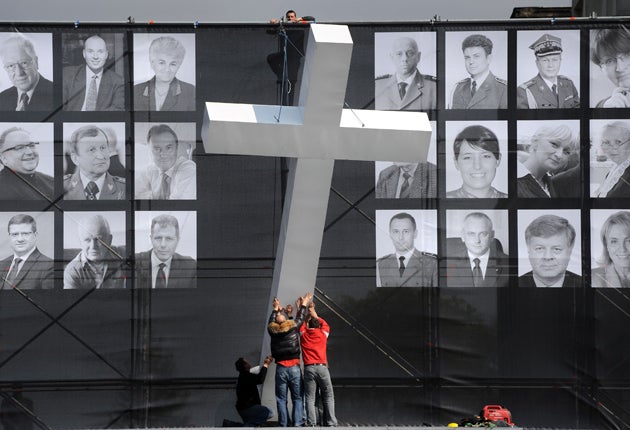Will the world's political elite make it to funeral of Polish President?
Volcanic ash cloud closes Warsaw airport ahead of tomorrow's state event

Your support helps us to tell the story
From reproductive rights to climate change to Big Tech, The Independent is on the ground when the story is developing. Whether it's investigating the financials of Elon Musk's pro-Trump PAC or producing our latest documentary, 'The A Word', which shines a light on the American women fighting for reproductive rights, we know how important it is to parse out the facts from the messaging.
At such a critical moment in US history, we need reporters on the ground. Your donation allows us to keep sending journalists to speak to both sides of the story.
The Independent is trusted by Americans across the entire political spectrum. And unlike many other quality news outlets, we choose not to lock Americans out of our reporting and analysis with paywalls. We believe quality journalism should be available to everyone, paid for by those who can afford it.
Your support makes all the difference.The cloud of Icelandic volcanic ash drifting south east across Europe threatens to disrupt tomorrow's planned state funeral of Polish president Lech Kaczynski and his wife.
Authorities closed main airports in Warsaw and northern Poland yesterday morning and by the afternoon they had shut the main airport in the southern city of Krakow, where the funeral is due to be held in the Wawel castle – the resting place of poets, kings and patriots including Marshal Pilsudski whose forces defeated an invading Soviet army in 1920.
Scores of world leaders, including President Barrack Obama, President Nicolas Sarkozy and Chancellor Angela Merkel are scheduled to attend the event which will be the highpoint of ceremonies mourning the deaths of the president and 95 senior military and political figures killed in last Saturday's devastating air crash in western Russia.
Poland's presidential palace spokesman, Jacek Sasin, insisted yesterday that the funeral was still on course to take place. "The will of the family is that under no circumstances should the date of the funeral ceremonies be changed and that they should go ahead as planned," he said.
His remarks raised the possibility that Poland would be forced to hold tomorrow's burial service without most of the world leaders who have pledged to attend.
Brian Flynn of Eurocontrol in Brussels said yesterday that the situation was "constantly evolving" and that a decision on whether allow flights into Poland tomorrow would be taken with 24 hours. "We are in touch will all those concerned," he added.
But Mr Sasin, the presidential spokesman, was emphatic: "Respect for the dead and for all those involved in the preparations does not allow for change," he said.
Tomorrow's funeral will be preceded by a major ceremony for the other crash victims in central Warsaw today.
The authorities in Krakow said that 80 flights carrying world leaders, including Mr Obama's Air Force One, would have to land at the city's airport during a six-hour period tomorrow morning. The White House said yesterday that the US President was still intending to fly to Krakow despite the threat posed by volcanic ash. A spokesman for Prince Charles, who is to represent Britain at the funeral also said that there had as yet not been any plans to call off the Prince's visit.
However, given the current south easterly airflow over Europe, meteorologists were predicting that the ash cloud would cover the entire upper atmosphere over Poland today.
The plane carrying the president and his party crashed in thick fog in woods outside Smolensk airport in western Russia last Saturday after the pilot ignored warnings not to land. They had been en route to a ceremony marking the 70th anniversary of the Katyn massacre in which 22,000 Polish officers were murdered by Stalin's secret police in 1940. The crash was described as the country's worst political tragedy since the Second World War.
Join our commenting forum
Join thought-provoking conversations, follow other Independent readers and see their replies
0Comments